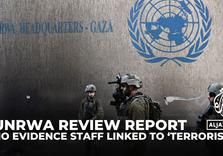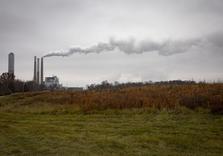Tens of Thousands of Israelis Demonstrate against Netanyahu, Demand Hostage Exchange Deal, New Elections Ann Arbor (Informed Comment) – The Israeli newspaper Arab 48 reports that tens of thousands of Israelis rallied Saturday night against the government of Prime Minister Benjamin Netanyahu in Tel Aviv and other cities, including Jerusalem, Beersheba and Haifa. The protesters were responding in part to dueling news releases about the possibility of a breakthrough […] |
Why Scapegoating the UN Relief and Works Agency — Which Helps Palestinians — Must Stop ( Al-Shabakah ) – Shatha Abdulsamad· Informed by the understanding that Palestinian displacement is a combined effect of the UN Partition Plan of 1947 and the creation of the State of Israel, to which the UN bore responsibility, the international community recognized that the question of Palestine and the plight of Palestinians refugees warranted special […] |
excerpt:OverviewThe United Nations Relief and Works Agency for Palestine (UNRWA) is facing politically induced financial pressure that looms over its future and very existence, putting the lives and rights of more than 5.9 million Palestinian refugees in jeopardy. Owing to historical and political reasons, the international community devised a distinct regime for Palestinians forcefully displaced in 1948, different from other refugee issues. As UNRWA is the only institution left of that unique regime, its demise would eliminate the only standing international agency concerned with Palestinian refugees, and with it their just plight. For decades, Israel has spearheaded a campaign against UNRWA meant to erase the question of Palestinian refugees and their collective right of return. While not new, the latest defunding of the agency by Israel’s allies is unprecedented in terms of its scope and perilous timing. This policy brief situates the founding of the distinct regime for Palestinian refugees and examines its significance. It analyzes the current defunding of UNRWA within Israel’s decades-long campaign to dismantle the agency. Lastly, it elaborates on the far-reaching implications of eliminating UNRWA, and puts forth a set of recommendations to thwart the effort to do so. Why a Distinct Regime for Palestinian Refugees?Israel has systematically accused UNRWA of many things, including perpetuating the Palestinian refugee problem, arguing that its operations should be ceased and its responsibilities passed to other international relief agencies. Besides being unfounded, these claims also obfuscate the Palestinian right of return. For various historical and political reasons, displaced Palestinians are treated in a unique way under the international refugee regime, outside the scope of the 1951 Convention Relating to the Status of Refugees and its related instruments. Instead, the UN conceived a separate institutional framework to address their displacement. Informed by the understanding that their displacement is a combined effect of the UN Partition Plan of 1947 and the creation of the State of Israel, to which the UN bore responsibility, the international community recognized that the question of Palestine and the plight of displaced Palestinians warranted special measures and attention. This was manifested in the adoption by the UN General Assembly (UNGA) of Resolution 186, which called for the appointment of a UN Mediator for Palestine. One day before his assassination by Zionist paramilitary group Lehi, UN Mediator Count Folke Bernadotte recommended that the UN affirm the right of Palestinian refugees to return to their homes. Pursuant to his recommendation, on December 11, 1948, the UNGA adopted Resolution 194 (III), reiterating the right of displaced Palestinians to return “at the earliest practicable date,” and establishing the UN Conciliation Commission for Palestine (UNCCP). The latter took over the main mediator functions, including negotiating a solution to the Palestine question. While the intention of the drafters was that the displaced “should be allowed to return when stable conditions had been established” rather than be “conditional upon the establishment of a formal peace,” the UNNCP was charged to resolve the predicament of their return through a peaceful adjustment. As Palestinian return hinged on Israeli recognition of this collective right, the question of Palestinian repatriation was inextricably linked to a broader political resolution. The UNCCP therefore became the political leg of the framework devised for Palestinian refugees. One year after the UNCCP was formed, and in response to the mounting needs of the hundreds of thousands of displaced Palestinians, the UN established UNRWA with a temporary mandate as a subsidiary organ of the UNGA to provide relief and works services to the refugees awaiting their repatriation. Together, these institutional bodies comprised the two wings of the distinct regime applicable to displaced Palestinians, rendering them the only group of people to whom a separate and specific system applies. The idea of keeping displaced Palestinians within the scope of the UNCCP and UNRWA should be understood as a combined effect of maintaining the full humanitarian and political responsibility of the UN over their plight, as well as of the need to resolve their displacement through return rather than resettlement, which was promoted for other refugee problems in the period after the Second World War. The UNCCP fell into demise in 1960 due to the lack of prospect in reaching a political settlement that would allow the return of displaced Palestinians, reducing the unique framework by one of its legs. Importantly, the demise of the UNCCP put more emphasis on funding UNRWA than on addressing the underlying political predicaments that Israel put in place to bar Palestinian return. By focusing on the humanitarian symptoms of Palestinian displacement instead of contesting its political underpinnings, both the international community and Israel sought to substitute humanitarian aid for justice. For almost 40 years after its birth, renewals of UNRWA’s mandate by the UNGA were a matter of routine. In the absence of a political solution, UNRWA was not only an embodiment of international responsibility for the question of Palestinian refugees, but it was also perceived as a stabilizer that prevents social and political upheavals in the region through the provision of its lifeline services. UNRWA and Power PoliticsWhile the UNGA has repeatedly renewed UNRWA’s mandate, which now stands alone as the only UN agency concerned with the plight of displaced Palestinians, most recently extending it until 30 June 30, 2026, this is not matched with sustainable funding. Moreover, the funds that are provided often come with strings attached. Considering the temporary nature of UNRWA, its funding was made dependent on voluntary contributions. The biggest pledges to UNRWA have historically come from the US and Germany, followed by the EU (based on 2022 figures). As Palestinians remain denied their right of return, UNRWA has outlived its temporality more than seven decades after its inception. Nonetheless, the voluntariness of its funding has not changed, rendering it vulnerable to the political whims of donor states. Israel has long spearheaded a consistent campaign against UNRWA aimed at its termination. Aligned with and stemming from the inherently racist roots of Zionism and its settler colonial ideology, Israel’s warfare against UNRWA is associated with the agency being the only standing international commitment left toward the right of return of Palestinians and an embodiment of international responsibility for the question of Palestinian refugees. Israel’s recurring and escalating attacks on UNRWA are meant to erase the question of Palestinian refugees and dismiss their collective right of return. Since its establishment through settler colonial violence, Israel was not disposed to accept the repatriation of Palestinians as it saw in their return a threat to its existence. To that end, it put in place multiple measures that prevented the return of approximately 750,000 displaced Palestinians. Consistent with the settler colonial and racist roots of Zionist ideology, the newly established State barred the return of Palestinians to their homes and land in order to take up Palestinian geography without its Palestinian demography, all the while seeking to replace them with Jewish migrants to establish and then preserve a Jewish majority. However, the signing of the Oslo Accords in 1993 and the creation of the Palestinian Authority (PA) gave Israel new opportunities to bury the question of Palestinian refugees once and for all. Even though the right of return is not subject to negotiation, the question of Palestinian refugees was relegated to a bilateral Israeli-Palestinian matter and among the “permanent status issues.” As a result, Israel hoped that UNRWA services would be transferred to the PA and Arab States to achieve a formal integration of a large portion of the Palestinian refugee population. While refusing to repatriate Palestinian refugees on the basis that it needs to preserve a Jewish demographic majority, Israel promoted the idea of settling Palestinian refugees in their host states as a substitute for repatriation. However, as Arab states were reluctant to integrate Palestinian refugees, Israel had a strong interest to weaken UNRWA in order to force Arab states to provide services to the refugee population, leading to their de facto integration in their host states. Israel’s antagonism of UNRWA became palpable in the aftermath of the Oslo Accords. Its strategic political efforts to delegitimize the agency evolved and intensified over time, and have included defamation, disinformation, and manufactured claims of antisemitism, to name a few. These accusations further severed UNRWA’s financial crisis as they diverted funding further away from regular programs and more into special projects to address these accusations. UNRWA’s funding struggle was further exacerbated in 2018, when the Trump administration ceased its funding for the agency, which until then had amounted to $360 million a year and contributed to one third of its annual budget. As the largest donor to the agency, the decision was politically motivated to force the Palestinians back to the negotiating table with Israel, amid US auspices of normalization agreements between Israel and some Arab states. Despite the Biden administration’s decision to partially restore funding to UNRWA in 2021, Trump’s move plunged UNRWA into a historic deficit that it has never fully recovered from. Defunding in the Face of GenocideToday, UNRWA faces mounting financial pressure that looms over its future following the suspension and reduction of funds by many of the agency’s largest donors, including the US, Germany, and the UK. These cuts followed unsubstantiated Israeli allegations that 12 of UNRWA’s 13,000 staff in Gaza may have been involved in Hamas’s 2023 Al-Aqsa Flood Operation. While some of the funds have since been reinstated, as the allegations have failed to be proven, the unprecedented cuts of the bulk of UNRWA’s funding cast serious threats over its survival. Against the backdrop of UNRWA’s chronic budget deficit, the agency’s ability to service Palestinian refugees and to sufficiently fulfill its assistance mandate were already hampered prior to October, 2023. Nevertheless, the latest defunding of UNRWA by Israel’s allies is not only a symptom of the structural obstacle in UNRWA’s funding framework. It is also the culmination of Israel’s deliberate strategy to obliterate the agency and put an end to the inalienable right of return. In fact, Israeli Prime Minister Benjamin Netanyahu has called for UNRWA to be dissolved in his post-war plans for Gaza, while similar calls were made to close down the UNRWA office in Jerusalem. What makes the latest defunding campaign against UNRWA different is its timing, just one day after the International Court of Justice (ICJ) issued its interim ruling recognizing the plausible risk of genocide by the State of Israel. In its provisional measures, the ICJ ordered that Israel “shall take immediate and effective measures to enable the provision of urgently needed basic services and humanitarian assistance to address the adverse conditions of life faced by Palestinians in the Gaza Strip.” The defunding campaign against UNRWA was a blatant form of retribution for the ICJ ruling, intended to distract from its conclusions. Instead of suspending financial aid and military assistance to Israel, the decision to rescind funding from the backbone of humanitarian aid provided to Palestinian refugees in Gaza underscores the blatant disregard of state obligations under the Genocide Convention. According to the Genocide Convention, states have a responsibility to take measures to prevent and to punish the crime of genocide. That obligation, in addition to the prohibition of genocidal acts, is considered a norm of international customary law and is therefore binding for all states, regardless of whether or not they have ratified the convention itself. Indeed, Nicaragua instituted legal proceedings against Germany at the ICJ for failing to respect its obligation to prevent genocide against the Palestinian people by cutting off its assistance to UNRWA, among other actions. While not new, the latest campaign against UNRWA is particularly alarming. Its unprecedented scope and perilous timing disregards the lifesaving needs of the millions of Palestinians in Gaza at such a critical moment. At such a crucial moment, UNRWA’s collapse will have a devastating toll on the Palestinian refugee population both in and beyond Gaza. Implications of Dismantling UNRWAWithout sufficient funding, UNRWA cannot continue to carry out its vital operations in the West Bank, Gaza, Jordan, Lebanon, and Syria. Defunding UNRWA would be a violation of international law, with respect to UNRWA’s mandate to provide assistance to Palestinian refugees until their return is made possible. As the primary provider of lifeline and humanitarian aid for Palestinian refugees, the cessation of its operations and services would leave 5.9 million Palestinian refugees in the region without education, healthcare, jobs, water, sanitation, or infrastructure projects in the refugee camps where UNRWA operates. This effectively means the mass destruction of civic life for Palestinian refugees. In Gaza, specifically, the besieged population is more dependent on UNRWA for lifesaving services and support than ever before amid Israel’s genocidal onslaught. As the largest humanitarian organization operating there, UNRWA manages overcrowded shelters, food assistance (nearly 250 thousand people in the north of Gaza depend on UNRWA food aid since the beginning of the genocidal campaign), and primary health care (around 570,000 people, including more than 300,000 children, have benefited from UNRWA’s psychological support in Gaza). Cutting off funding to UNRWA thus amounts to a death sentence, especially as Palestinians in Gaza continue to face man-made famine and the outbreak of disease under Israel’s relentless and indiscriminate bombardment and deliberate deprivation of aid. The obstruction of the humanitarian aid that UNRWA provides will contribute to the carnage in Gaza. As no other UN agency has the capacity to replace UNRWA nor to deliver the same scale and breadth of the assistance it provides, the cessation of UNRWA would further exacerbate the anticipated complex humanitarian catastrophe ahead. On the specific impact in Gaza amid the genocide, Commissioner General of UNRWA, Philippe Lazzarini, warned that, “the entire humanitarian response in Gaza will crumble,” if UNRWA is dismantled, arguing, “The notion that the Agency can be dismantled without violating a host of human rights and jeopardizing international peace and security is naïve at best.” A UN-led group of aid agencies, known collectively as the Inter-Agency Standing Committee (IASC) also warned that withdrawing funds from UNRWA “would result in the collapse of the humanitarian system in Gaza, with far-reaching humanitarian and human rights consequences in the Occupied Palestinian Territory and across the region.” Similarly, a coalition of over fifteen international aid organizations sounded the alarm over UNRWA’s central role in the humanitarian response in Gaza, writing, “if the funding suspensions are not reversed, the risk of a complete collapse of the already restricted humanitarian response resulting in preventable loss of lives in Gaza becomes even more likely.” As Nicaragua’s case against Germany makes clear, defunding UNRWA amid the unfolding genocide in Gaza breaches the legal obligation on states to prevent genocide, and thus exposes complicit states to legal consequences for aiding and abetting Israel’s war crimes. As Nicaragua argued before the ICJ:
This argument also applies to the US, which not only cut off funds to UNRWA, but whose Congress also passed a one-year ban on UNRWA funds. The defunding campaign launched against UNRWA risks the erasure of the last standing international commitment toward the just plight of Palestinian refugees and their collective right of return, as enshrined in Resolution 194. The threat to the survival of UNRWA as the only agency concerned with Palestinian refugees should be a concern for every Palestinian and policymaker. Suspending UNRWA funds at such a critical time serves Israel’s aim to eliminate the agency in its entirety—and with it the Palestinian refugee issue. Recommendations
Shatha Abdulsamad is pursuing her MA in International Human Rights Law and Refugee Studies at the American University in Cairo. New EPA Rules will force Fossil Fuel Power Plants to cut Pollution By: Robert Zullo – ( Michigan Advance ) – The U.S. Environmental Protection Agency on Thursday released a sweeping set of rules aimed at cutting air, water and land pollution from fossil fuel-fired power plants. Environmental and clean energy groups celebrated the announcement as long overdue, particularly for coal-burning power plants, which have saddled hundreds of communities […] |

No comments:
Post a Comment
Note: Only a member of this blog may post a comment.